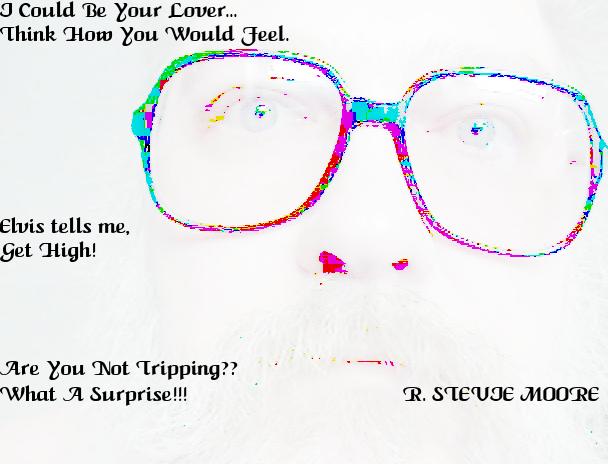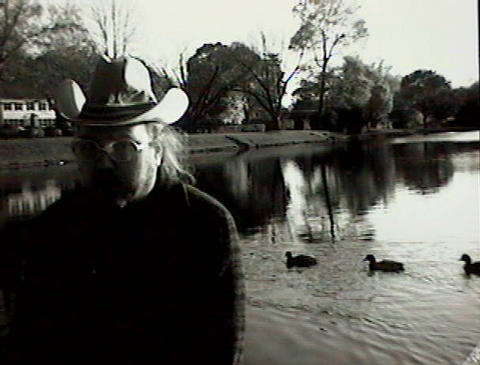CONTACT RISK
REVIEWS Pt. 2

|
BOSTON PHOENIX OFF THE RECORD POP 6/4/93 by Michael Bloom • • ¼ (2 1/2 stars) R. Stevie Moore is a phenomenon, the patron saint of DIY recording. Growing up among the Nashville cats, and taught a few licks by his uncle Scotty (sic), he decided he liked the British Invasion stuff better and utimately moved to New Jersey. He bought a couple of tape recorders and taught himself to use them---in particular to exploit the primitive sound quality of home recording and his just-good-enough guitar, keyboards, and singing for musical purposes. For the last 20 years or so, he's released his work on a series of something like 200 cassette albums. Tower PULSE Record Reviews Rock / Pop July 1993 by Harold DeMuir Jersey-based home-recording Abbey Road Map L.A. distributor Quick Cuts April 12, 1993 by Steve "Spaz" Schnee If rock and roll was more like a baseball game, then R. Stevie Moore would be playing left field...and I mean DEEP left field! For 25 years, R. has been recording music at home with friends and (mostly) by himself. Apart from the occasional studio time, most of R.'s stuff has been strictly lo-fi affairs, which tend to concentrate more on song craft than on anything else. And that is what makes R. such a complete and utter genius! There's no one in pop music today who has put out such a large variety of music and has totally remained himself. Whatever style he touches he turns into R. Stevie. Whatever style touches him, he turns it into R. Stevie. It would be safe to say he walks the line between the Beatles, Ferlin Husky and the Residents. With Contact Risk, you get just a tiny portion of R. Stevie's world, but it's the perfect way to introduce yourself. From the pure wonderful pop of "Under The Light," "Alecia" and "I Like To Stay Home" (which is from one of my fave albums of all time, Glad Music) to the roller rink country of "Elation Damnation," this is odd-ball and exciting to encounter. Now, audiophiles or fans of REO Speedwagon may not quite understand R. Stevie, but if you choose to accept this "risk," then you will become hooked, as I have been for the last decade. Fans of the "lo-fi" movement, which includes early Sebadoh, Tall Dwarfs, Weird Paul, and all the obligatory "demo" B-sides that grace import singles nowadays, stand up and pay attention to the "King of Lo-Fi," R. Stevie Moore. Now, if only more of this stuff was available on CD...(You can also subscribe to his most excellent cassette and video club by writing to the address listed in the CD!) Santa Cruz SENTINEL California Music SPOTLIGHT April 16, 1993 by Scott Hipper R. Stevie Moore, king of the underground CITY PAPER Baltimore MD Vinyl Finals July 2, 1993 by John Lewis Despite being hailed by critics, R. Stevie Moore's music has been woefully ignored and underappreciated. Moore has an impressive set of clips: New Musical Express called him a "genius of rare order"; Melody Maker praised his "smart idiosyncratic music"; and Rolling Stone dubbed him an "undiscovered American treasure." Still, the prolific singer-songwriter continues to languish in relative obscurity despite having produced more than 200 full-length home tapes and eight albums for a variety of independent European labels. Contact Risk is a compilation of tunes plucked from Moore's voluminous catalogue of home tapes, and it serves as an excellent introduction to his strange musical world. The 21 cuts bring to mind alternately Todd Rundgren, Frank Zappa, the Beatles, and a countrified Bob Dylan. Three short spoken-word pieces (each one titled "I Could Be Your Lover") are also oddly endearing. With the recent major-label signing of cassette underground fave Daniel Johnston, maybe it's possible Moore will get signed and reach a wider audience. He certainly deserves a shot. SOUND VIEWS Brooklyn NY Mini Views July 1993 by Kevin Roe Mighty strange stuff indeed from a cult figure with an admitted addiction to home recording. This collection of 21 tracks recorded in various basements, closets and bathrooms over the past two decades reveals a quirky, experimental musical mind and a resulting "sound" that runs the gamut from bubble gum to the almost unlistenable bizarre. Moore, a Nashville studio veteran, also shows a flair for country honky tonk on "Elation Damnation," an infectuous 2-4 shuffle with synsonic drum parts straight out of the local shopping mall's organ store. For the truly weird, though, turn off all the lights and turn on "I Could Be Your Lover," a three-part spoken word piece in which Moore somberly intones, "Elvis tells me, 'Get high!,'" among several other nonsequiturs. Whatever your take on Moore's eccentric dabblings, he consistently pushes the boundaries of musical expectations. He's a road less traveled kinda guy. And that may or may not, make all the difference, depending on whether you're a pristine Garden State Parkway person or a Route 1 sorta junkfood junkie. [CD] The RIVER BURNS Cleveland OH Music October 21, 1993 by Peanuts CONTACT RISK is a 21 song compilation and a fraction of Moore's 200 or so worldwide released cassettes. The disc runs from the Zappa-influenced "Under The Light" and the off-kiltered country of "Elation Damnation" to the mlldly offbeat pop of "Alecia" and "You Can't Write A Song." Spoken poetry shows up via "I Could Be Your Lover," yet Moore's music jumps from the loping "You Love Me, Do Something" to the "Sponge Bath" instrumental. If the mental witches, warlocks, gnomes and elves in your psyche don't bother you, then R. Stevie Moore's eclectic voodoo music should be easy to handle.  ALL MUSIC GUIDE
ALL MUSIC GUIDEby Stewart Mason 2001 R. Stevie Moore's first CD release (hence the punning title), 1993's Contact Risk is one of the New Jersey-based D.I.Y. auteur's most enjoyable compilations. Reaching all the way back to "Ill (Worst)," a Syd Barrett-like 1968 home recording by the then-16-year-old Moore's first band, the Marlborough, Contact Risk delivers 21 tracks of quirky but immensely enjoyable art pop. Most compilations sampling the literally hundreds of homemade cassettes for sale through the R. Stevie Moore Cassette Club tend to focus on one aspect or another of Moore's musical personality, be it his talent for super-catchy pop songs, his skill at constructing bizarre sound montages, or his Bonzo Dog Band-like facility at dadaist genre parody. Contact Risk hits all three and adds a few more for good measure. Like the pop songs? Contact Risk includes Moore's very best, "Play Myself Some Music," a heartbreaking ode to the restorative powers of pop that predates Nick Hornby's High Fidelity by a full decade, along with twisty gems like "Under the Light," which would fit on a Wings album, and the insistently bouncy "You Love Me, Do Something." Prefer the weird things? Try the synthesizer solo "Sponge Bath" and the three-part "I Could Be Your Lover," spoken word surrealism that's alternately hilarious and chilling. Meanwhile, Moore essays Barry White-style loverman-rap ("Times Have Changed"), Buck Owens-style country ("Elation Damnation"), and hip-hop ("Oil"), as well as a few of his more traditional solo acoustic folk-style songs. The only problem with Contact Risk for longtime R. Stevie Moore fans is that over a quarter of these songs have appeared on previous vinyl artifacts; while having them in improved digital fidelity is nice and all, Moore has written so many brilliant songs that it would have been easy to find some more obscure gems. S.M. |



Download available at Bandcamp